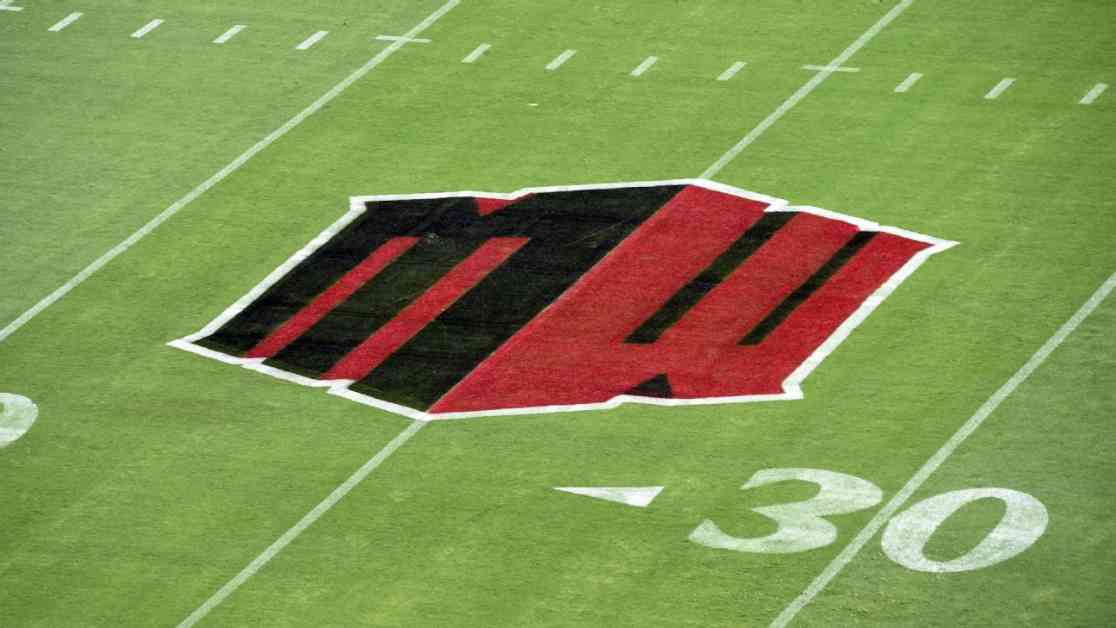Air Force and UNLV have decided to remain in the Mountain West Conference, despite receiving offers from other conferences. This decision was influenced by significant financial incentives offered to both schools, made possible by the exit fees that the conference’s departing members will be responsible for paying. The collective exit fees from Boise State, Colorado State, Fresno State, San Diego State, and Utah State are expected to total around $18 million per school.
UNLV’s choice to stay in the Mountain West comes after considering an offer from the Pac-12. Similarly, Air Force had attracted interest from the American Athletic Conference. With these commitments, the Mountain West now has seven football-playing members and will need to add two more full members to meet NCAA requirements.
The Pac-12 had hoped that UNLV would join the other five MWC schools in the new-look conference, as it aims to rebuild from last year’s challenges. However, with UNLV’s decision to stay in the Mountain West, the Pac-12 will need to explore other options for expansion. The remaining MWC schools – Hawai’i, New Mexico, Nevada, San Jose State, and Wyoming – are expected to sign agreements to remain in the conference.
The Pac-12 recently filed a lawsuit challenging a “poaching penalty” included in a football scheduling agreement with the Mountain West. This penalty requires the Pac-12 to pay a fee of $10 million if a school leaves the MWC for the Pac-12, with additional fees for each additional school. The Mountain West argues that the Pac-12 owes them $55 million due to the five departures.
UNLV and Air Force initially reaffirmed their commitment to the Mountain West on Monday but adjusted their stance following Utah State’s decision to leave. This move came amidst a flurry of activity in college realignment, which also saw Memphis, Tulane, South Florida, and UTSA decline offers to join the Pac-12 and remain in the AAC.
The news of UNLV and Air Force’s decision was first reported by the Action Network, highlighting the complexities and challenges of conference realignment in college athletics.
Financial Incentives Influence Conference Decisions
The financial incentives offered to UNLV and Air Force played a significant role in their decisions to remain in the Mountain West Conference. With the collective exit fees from the departing members helping to fund these incentives, both schools were able to secure their positions within the conference. This highlights the importance of financial stability and support in the world of college athletics, where decisions can have long-lasting implications for programs and institutions.
UNLV’s choice to turn down an offer from the Pac-12 demonstrates their commitment to the Mountain West and their belief in the future of the conference. While the allure of joining a power conference may have been tempting, the financial package offered by the Mountain West was ultimately more appealing. Similarly, Air Force’s decision to stay put despite interest from the AAC showcases their dedication to the Mountain West and the opportunities it presents.
Impact on Pac-12 and Mountain West
The decisions by UNLV and Air Force to remain in the Mountain West have significant implications for both conferences. The Pac-12, which was hoping to add the Rebels to its roster of schools, will now need to explore other options for expansion. The Mountain West, on the other hand, can continue to build on its existing foundation and look towards adding new members to meet NCAA requirements.
The legal battle between the Pac-12 and the Mountain West over the “poaching penalty” adds another layer of complexity to the situation. The lawsuit filed by the Pac-12 challenges the legality of the penalty, arguing that it inhibits competition and imposes punitive monetary fees. This dispute underscores the tensions and challenges that can arise in conference realignment discussions.
Looking Towards the Future
As the landscape of college athletics continues to evolve, conferences must navigate complex decisions and negotiations to ensure their long-term success. The choices made by UNLV and Air Force to stay in the Mountain West reflect the careful balance of financial considerations, competitive opportunities, and institutional priorities.
Moving forward, the Mountain West will need to focus on adding new members to strengthen its position within the NCAA. The Pac-12, meanwhile, will need to regroup and consider alternative strategies for expansion. The legal battle between the two conferences serves as a reminder of the complexities and challenges inherent in conference realignment efforts.
Overall, the decisions made by UNLV and Air Force highlight the importance of financial incentives and institutional loyalty in shaping the future of college athletics. As conferences continue to adapt to changing circumstances and competitive pressures, these factors will play a crucial role in determining their success and sustainability in the years to come.








